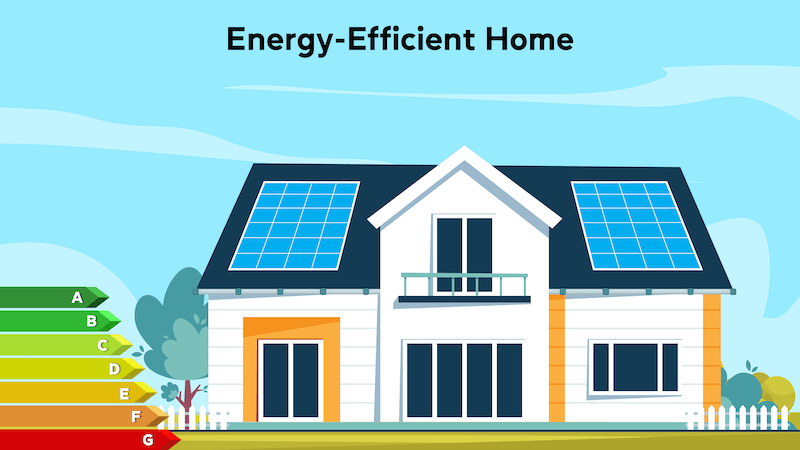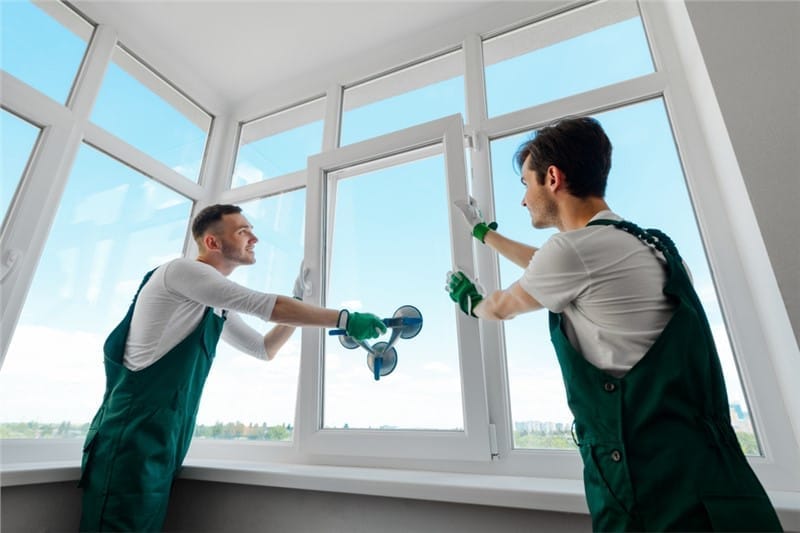- Established warranties, financing options, consistent quality standards
- Higher overheads reflected in pricing, less flexibility on custom requirements
Free Double Glazing Windows Cost Calculator Without Pushy Sales Calls

Double glazing costs in the UK typically range from £300-£800 per window. Here's what you can expect to pay based on current market research and regional variations:
2-bedroom house: £2,000 - £5,000 (6-8 windows)
3-bedroom house: £3,000 - £7,000 (8-12 windows)
4-bedroom house: £5,000 - £10,000 (12-18 windows)
Use our double glazing cost calculator below to get your personalised glazing cost estimate instantly - no email or phone number required.
The average prices for new double glazed windows vary significantly based on window type, frame material, and glazing type. Most UK homeowners find that replacing all the windows represents a significant investment but proves to be a worthwhile investment for energy efficiency and property value.
Let's be honest about the current state of online double glazing cost calculators. Mo st existing tools are designed to harvest your personal details rather than provide genuine help with budgeting for new windows.
Traditional glazing cost calculator websites demand your email address and phone number before revealing any estimated cost information. This approach benefits window companies who want to bombard you with sales calls, but it doesn't help homeowners who simply want to understand windows cost and plan their budget.
We think this pushy approach is completely wrong for UK homeowners in the research phase.
We provide real double glazing cost estimates upfront. No email harvesting. No unwanted sales calls from national companies. Just honest pricing information to help you understand what you'll expect to pay.
You only share your contact details if you're genuinely ready to receive multiple quotes from trusted installers in your area. Otherwise, use our cost calculator, get your estimated cost, and continue your research at your own pace.
This approach respects that choosing new double glazed windows is a significant investment that requires careful consideration and comparison of different options.
Number of windows needing replacement: The total number of existing windows directly impacts your overall cost. Most professional installation companies offer better per window rates when replacing multiple windows simultaneously.
1-5 windows: Small project, higher cost per window
6-10 windows: Medium project, moderate savings
11+ windows: Large project, best per window rates
Terraced house: Limited access may increase labour costs
Semi-detached house: Standard installation process
Detached house: Easy access, potential for scaffolding costs
Flat/apartment: Ground floor vs upper floor considerations
Bungalow: Single-level installation, often most straightforward
Most popular window types and their typical costs:
| Window Type | Cost | Key Features |
|---|---|---|
| Casement Windows (side-opening) | £300-£600 each for uPVC versions |
Double glazed casement windows are the most common choice Excellent for ventilation and easy cleaning Available in various opening configurations |
| Sash Windows (up/down sliding) | £400-£800 each |
Popular in period properties and conservation areas Traditional appearance with modern double glazing efficiency More complex mechanism increases material costs |
| Tilt and Turn Windows | £400-£700 each |
European-style design gaining popularity in UK Dual opening function provides excellent ventilation Enhanced safety features with multi-point locking systems |
| Bay Windows | £800-£1,500 each |
Significant impact on room lighting and space Complex installation often requires structural considerations Premium pricing due to custom manufacturing requirements |
| French Doors | £600-£1,200 per pair |
Transform living spaces and garden access Available in various frame materials and glazing types Professional installation essential for weather sealing |
| Window Type | Cost | Pros | Cons | Lifespan |
|---|---|---|---|---|
| uPVC Windows (Most popular choice) | £300-£500 per window | Affordable pricing, low maintenance, excellent insulation | Limited colour options, potential for cheaper appearance | 20-30 years with minimal upkeep required |
| Aluminium Windows | £400-£700 per window | Slim profiles, contemporary appearance, exceptional durability | Higher upfront costs, potential for thermal bridging | Ideal for modern properties and commercial applications |
| Timber Windows | £500-£800 per window | Natural beauty, excellent insulation properties, traditional appeal | Regular maintenance required, highest material costs | Perfect for period properties and conservation areas |
| Composite Windows | £450-£750 per window | Combines benefits of different materials | Growing popularity among UK homeowners | Balances appearance, performance, and maintenance requirements |
| Glazing Type | Cost | Features | Recommendation |
|---|---|---|---|
| Standard Double Glazing | Base pricing for cost calculator estimates |
Suitable for most UK climate conditions Significant improvement over single glazing Good balance of cost and energy efficiency |
Ideal for most homeowners seeking moderate energy savings |
| Low-E Glass Double Glazing (Recommended by Energy Saving Trust) | Additional £30-£50 per window |
Potential savings: Up to £140 annually on heating bills Reflective coating improves energy efficiency significantly |
Worthwhile investment for most UK homeowners looking to improve energy efficiency |
| Triple Glazing | Additional £100-£150 per window |
Excellent insulation for extreme weather conditions Particularly beneficial in Scotland and northern England Provides superior noise reduction capabilities |
Best for colder climates and homes requiring top-tier insulation and noise reduction |
| Acoustic Glazing | Additional £40-£80 per window |
Specifically designed for noise pollution reduction Essential near busy roads, airports, or urban areas Different glass thicknesses optimise sound dampening |
Ideal for homes in noisy environments or areas with heavy traffic |
Total expected cost range: £2,000 - £5,000
A typical 2-bedroom property usually requires 6-8 new windows, including bedroom windows, living areas, kitchen, and bathroom. The final glazing cost depends heavily on window size, chosen materials, and installation complexity.Total expected cost range: £2,000 - £5,000
| Option | Cost Breakdown | Total Estimated Cost |
|---|---|---|
| Budget Option (uPVC, standard double glazing) |
6 standard casement windows: £1,800-£3,000 Basic professional installation: £200-£500 |
£2,000-£3,500 |
| Mid-Range Option (uPVC with Low-E glass) |
6 energy efficient windows: £2,400-£3,600 Professional installation with warranty: £400-£600 |
£2,800-£4,200 |
| Premium Option (timber or aluminium frames) |
6 high-specification windows: £3,000-£4,800 Expert installation and finishing: £500-£800 |
£3,500-£5,600 |
The installation process for smaller properties typically takes 1-2 days, minimising disruption while maximising energy efficiency improvements.
Total expected cost range: £3,000 - £7,000
Most 3-bedroom houses feature 8-12 windows including various window types such as casement windows, possibly sash windows in older properties, and potentially bay windows in reception rooms.
| Cost Factors Specific to 3-Bedroom Properties | Regional Pricing Variations |
|---|---|
|
|
The window frame material choice significantly impacts the overall cost, with uPVC windows offering the best value while timber windows provide premium aesthetics at higher prices.
Total expected cost range: £3,500 - £6,500
Semi-detached properties typically feature around 10 windows with relatively standard sizes, making them ideal for competitive pricing from local installers and national companies alike.
Advantages for semi-detached properties:
One shared wall reduces installation complexity
Standard window sizes keep material costs reasonable
Good access for installation teams
Often qualify for bulk pricing discounts
Installation considerations:
Coordinating with neighbours if they're also upgrading
Party wall regulations rarely apply to window replacements
Scaffolding costs shared between properties in some cases
Matching existing architectural features maintains street appeal
Total expected cost range: £5,000 - £10,000
Larger properties typically feature 12-18 windows including various window styles such as bow windows, bay windows, and potentially tilt and turn windows in modern developments.
Factors increasing costs in larger properties:
More windows naturally increase material costs
Larger window sizes require more substantial frames
Complex installations may need scaffolding
Higher-specification materials often chosen for premium properties
Common upgrades that add value:
Georgian bars: Additional £30-£50 per window
Coloured frames: Additional £50-£100 per window
Enhanced safety features: Additional £20-£40 per window
Noise reduction specifications: Additional £40-£80 per window
The installation process for larger properties typically requires 3-5 days, with professional installation teams working systematically through different areas to minimise disruption.
London and South East England: Expect to pay 15-20% above national averages due to higher labour costs, material transportation expenses, and increased demand from property developers and homeowners.
Scotland and Northern England: Generally 5-10% below national averages, though quality remains consistent with southern providers. Local installers often offer competitive rates while maintaining excellent standards.
Rural vs Urban Areas: Rural locations may incur additional travel costs for installation teams, while urban areas benefit from competitive pricing due to higher installer density.
Best Times for Cost Savings:
January-March: Quiet period for installers, often 10-15% discounts available
September-November: Companies clearing inventory before winter
Avoid peak summer: Highest demand period with premium pricing
Weather Considerations: Winter installations possible but may take longer due to weather delays. Spring and autumn provide optimal conditions for professional installation while often securing better prices.
| National Companies | Local Installers | Regional Specialists |
|---|---|---|
|
Advantages:
Disadvantages:
Typical premium: 10-20% above local installer rates
|
Advantages:
Disadvantages:
Cost savings: Often 15-25% below national company rates
|
Advantages:
Disadvantages:
Often the sweet spot for quality and value
|

Illustration of an energy-efficient home featuring solar panels, wind turbines, and a green landscape, symbolizing sustainable living and renewable energy solutions.
The Energy Saving Trust recommends choosing windows with high energy efficiency ratings to maximise heating bill reductions and improve overall home comfort.
Energy rating breakdown:
A+ Rating: Maximum efficiency, 15-20% heating bill reduction
A Rating: Excellent efficiency, 10-15% heating bill reduction
B Rating: Good efficiency, 8-12% heating bill reduction
C Rating: Basic efficiency, 5-8% heating bill reduction
Payback period calculations: Higher-rated windows cost more initially but save money over time through reduced heating bills and improved property values.
| Average UK Home Energy Savings | Factors Affecting Savings | Additional Benefits Beyond Cost Savings |
|---|---|---|
|
|
|

The image represents financial growth over time, with an hourglass symbolizing the passage of time and a rising bar graph showing increasing wealth over time.
Quality new double glazed windows typically provide returns through multiple channels, making them a worthwhile investment for most UK homeowners.
Property value increase:
Typically adds 5-10% to property value
Premium windows in good condition offer higher returns
Energy efficiency certificates improve marketing appeal
Modern windows enhance kerb appeal significantly
Comfort improvements:
Dramatic noise reduction, especially with acoustic glazing
Elimination of cold spots near windows
Reduced heating system workload
Better indoor air quality through improved ventilation control
Payback period calculations: Higher-rated windows cost more initially but save money over time through reduced heating bills and improved property values.

Professional window installer cleaning a large window in a bright, modern interior, showcasing expert window maintenance.
Immediately avoid installers who:
Arrive uninvited at your door with "special offers"
Pressure you to sign contracts during initial visits
Request large deposits before work commences
Cannot provide local references or portfolio examples
Quote prices over the phone without property surveys
Professional installers demonstrate:
FENSA registration ensuring building regulations compliance
Comprehensive insurance covering public liability and workmanship
Local references from recent customers you can contact
Written warranties clearly explaining coverage and duration
Detailed quotations specifying all materials and labour costs
Quote comparison strategy:
Obtain 3-5 detailed quotations for accurate market comparison
Ensure all quotes specify identical materials and glazing types
Compare warranty terms and aftercare services offered
Consider installer reputation alongside pricing
Quote evaluation criteria:
Pricing: Should be within 20% range - significant variations indicate potential issues
Specifications: Detailed material lists enable proper comparison
Timeline: Realistic installation schedules indicate proper planning
Terms: Clear payment schedules and warranty conditions
Immediately avoid installers who:
Arrive uninvited at your door with "special offers"
Pressure you to sign contracts during initial visits
Request large deposits before work commences
Cannot provide local references or portfolio examples
Quote prices over the phone without property surveys
Professional installers demonstrate:
FENSA registration ensuring building regulations compliance
Comprehensive insurance covering public liability and workmanship
Local references from recent customers you can contact
Written warranties clearly explaining coverage and duration
Detailed quotations specifying all materials and labour costs
Quote comparison strategy:
Obtain 3-5 detailed quotations for accurate market comparison
Ensure all quotes specify identical materials and glazing types
Compare warranty terms and aftercare services offered
Consider installer reputation alongside pricing
Quote evaluation criteria:
Pricing: Should be within 20% range - significant variations indicate potential issues
Specifications: Detailed material lists enable proper comparison
Timeline: Realistic installation schedules indicate proper planning
Terms: Clear payment schedules and warranty conditions
How long does double glazing installation take?
Installation timeframes vary depending on property size and complexity. Single window replacement takes 2-4 hours. Small houses with 6-8 windows require 1-2 days, medium houses with 8-12 windows need 2-3 days, and large houses with 12+ windows take 3-5 days. Factors affecting duration include window complexity, access difficulties requiring scaffolding, weather conditions, structural modifications, and quality standards ensuring proper sealing.
Can I replace just one window cost-effectively?
Single window replacement is possible but costs 20-30% more per window than bulk installations due to minimum charges and reduced economies of scale. It makes sense for emergency repairs, budget constraints, testing installer quality, or addressing specific failing windows while others remain serviceable. Consider future replacement needs and styling consistency when planning single window projects.
What happens to old windows after replacement?
Professional installers typically handle complete removal, site cleanup, and legal disposal of old windows. Most materials are recycled including glass into new products, metal frames for their value, and improving uPVC recycling. Homeowners can arrange separate collection, retain frames for garden use, or donate usable windows to charities. Proper disposal ensur
Do double glazed windows increase property value?
Quality double glazed windows typically add 5-10% to property value through energy efficiency improvements, enhanced security, noise reduction, and improved kerb appeal. Value increases depend on existing window conditions, property type, and local market factors. Maximum returns come from complete replacement using quality materials and professional installation, with additional benefits including marketing appeal and potential insurance savings.
Should I choose A-rated or C-rated energy efficient windows?
A-rated windows provide superior insulation with U-values of 1.0-1.4 W/m²K compared to C-rated at 1.8-2.2 W/m²K. A-rated windows save £12-20 annually per window versus £5-10 for C-rated. The £50-100 premium per window typically pays back within 5-8 years through energy savings, plus offers better comfort, condensation control, and property value enhancement.
Can double glazing be installed in winter?
Our calculator provides realistic estimates to help plan your double glazing project budget and compare different options without sales pressure or unwanted contact.
Our calculator provides realistic estimates to help plan your double glazing project budget and compare different options without sales pressure or unwanted contact.
Our calculator provides realistic estimates to help plan your double glazing project budget and compare different options without sales pressure or unwanted contact.
Getting accurate estimates:
Honest measurements improve estimate precision
Realistic specifications appropriate for your budget
Location consideration for regional variations
Multiple scenarios to understand cost implications
Our calculator provides realistic estimates to help plan your double glazing project budget and compare different options without sales pressure or unwanted contact.